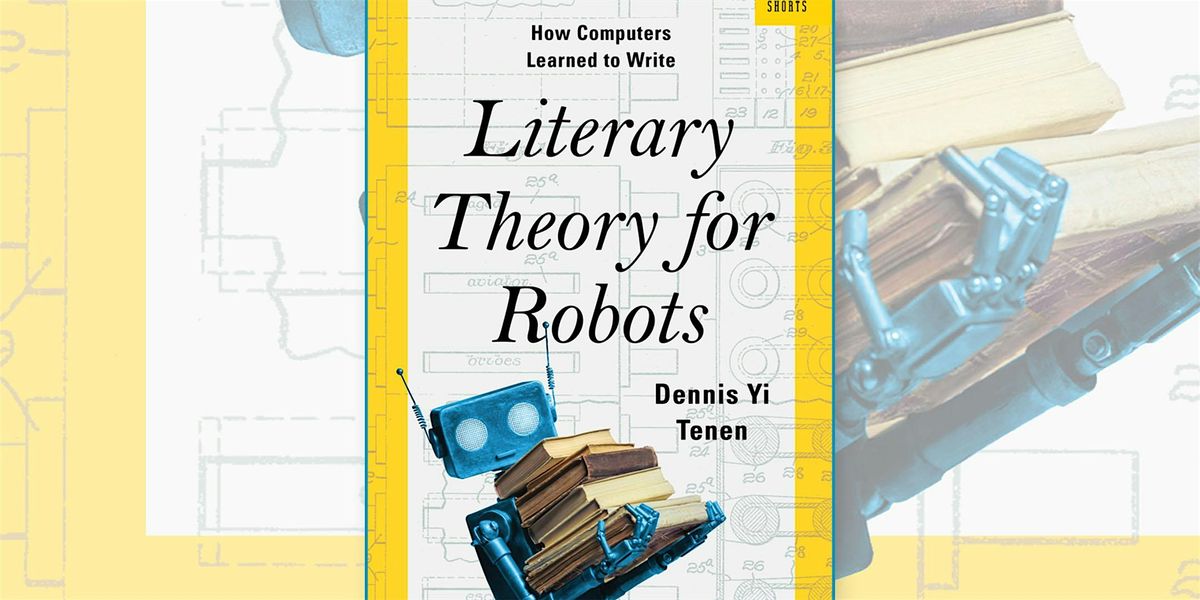
About this Event
by Dennis Yi Tenen
In the industrial age, automation came for the shoemaker and the seamstress. Today, it has come for the writer, physician, programmer, and attorney.
Literary Theory for Robots reveals the hidden history of modern machine intelligence, taking readers on a spellbinding journey from medieval Arabic philosophy to visions of a universal language, past Hollywood fiction factories and missile defense systems trained on Russian folktales. In this provocative reflection on the shared pasts of literature and computer science, former Microsoft engineer and professor of comparative literature Dennis Yi Tenen provides crucial context for recent developments in AI, which holds important lessons for the future of humans living with smart technology.
Intelligence expressed through technology should not be mistaken for a magical genie, capable of self-directed thought or action. Rather, in highly original and effervescent prose with a generous dose of wit, Yi Tenen asks us to read past the artifice—to better perceive the mechanics of collaborative work. Something as simple as a spell-checker or a grammar-correction tool, embedded in every word-processor, represents the culmination of a shared human effort, spanning centuries.
Smart tools, like dictionaries and grammar books, have always accompanied the act of writing, thinking, and communicating. That these paper machines are now automated does not bring them to life. Nor can we cede agency over the creative process. With its masterful blend of history, technology, and philosophy, Yi Tenen’s work ultimately urges us to view AI as a matter of labor history, celebrating the long-standing cooperation between authors and engineers.
About the Author
is an associate professor of English and Comparative Literature at Columbia University, where he also co-directs the Center for Comparative Media. His research happens at the intersection of people, text, and technology. A long-time affiliate of Columbia’s Data Science Institute, formerly a Microsoft engineer in the Windows group and fellow at the Berkman Center for Internet and Society, his code runs on millions of personal computers worldwide. Tenen received his doctorate in Comparative Literature at Harvard University under the advisement of Elaine Scarry and William Todd. The founder of Columbia’s Literary Modeling and Visualization Lab, he co-edits the On Method book series at Columbia University Press. His published work can be found in monographs including Plain Text: The Poetics of Computation (Stanford University Press, 2017), Literary Theory for Robots (W.W. Norton, 2024) and Author Function under contract with Chicago UP. His recent articles appear on the pages of Modern Philology, New Literary History, Amodern, boundary2, Computational Culture, and Modernism/modernity.
About the Speakers
is an architectural historian of the modern period at Columbia University. She works on architecture and internationalism and institutions; the technical and philosophical history of materials; the participation of buildings and design actors in political culture and global governance; architecture’s historiography, and epistemologies of time. Her first book, Designs of Destruction: The Making of Monuments in the Twentieth Century (University of Chicago Press, 2018) describes how a new definition of “the monument” arose from various plans within liberal internationalist organizations to protect and salvage famous building from destruction in the middle of the 20th Century.
writes and teaches about gender and sexuality in national and transnational cultures in the Department of English and Comparative Literature at Columbia University. She uses spatial and geographic frameworks (from the transpacific, to the regional, to the Global South) to examine previously unstudied archives (from the first works of English literature by Filipina and Filipino authors, to private papers that document connections between the Midwest and U. S. empire, to fashion shows in Manila). She contends that this combined analytical and archival approach extends our understanding of the importance of national, regional, transnational, and global dynamics in North America, the Philippines, and Asia.
is the Maria Rosa Menocal Professor of English and of Film and Media Studies at Yale University. John teaches and writes on media history and theory. He taught at the University of Iowa between 1986-2016. He is the author of Speaking into the Air: A History of the Idea of Communication (1999), Courting the Abyss: Free Speech and the Liberal Tradition (2005), The Marvelous Clouds: Toward a Philosophy of Elemental Media (2015), and most recently, Promiscuous Knowledge: Information, Image, and Other Truth Games in History (2020), with the late Kenneth Cmiel (all published by the University of Chicago Press).
Please email [email protected] to request disability accommodations. Advance notice is necessary to arrange for some accessibility needs. This event will be recorded. By being present, you consent to the SOF/Heyman using such video for promotional purposes.
Event Venue & Nearby Stays
Heyman Center for the Humanities, East Campus Residence Hall, New York, United States
USD 0.00
